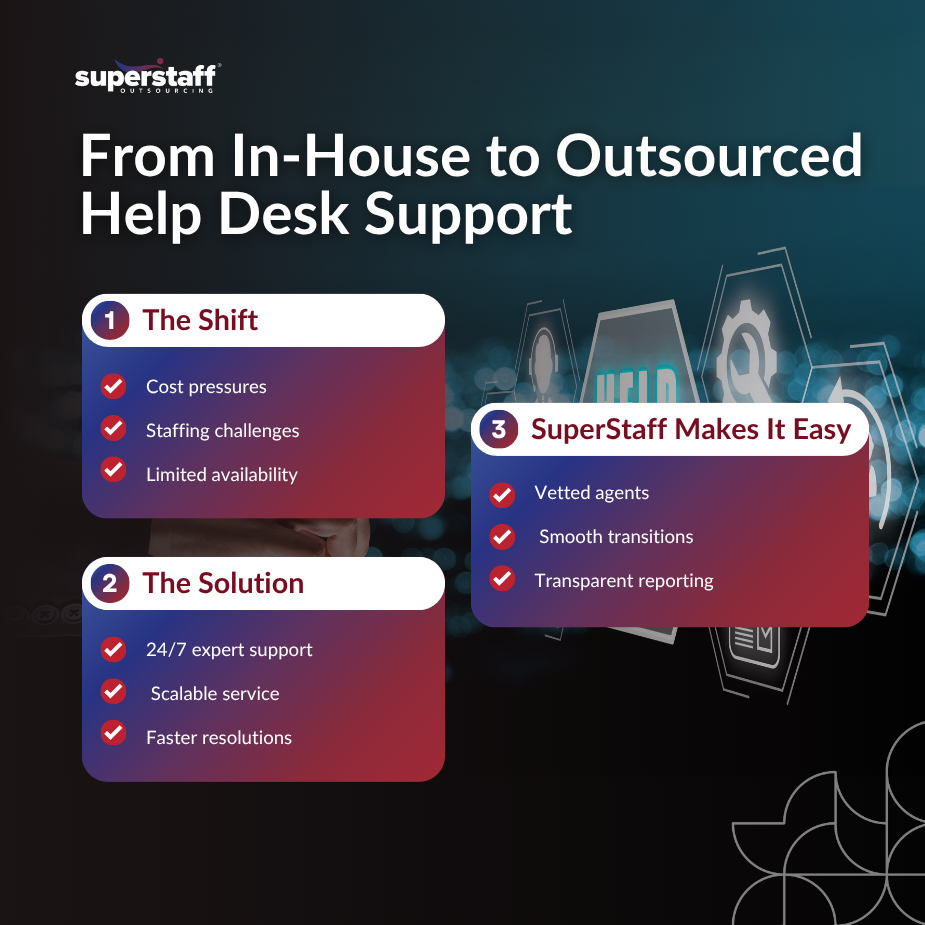
Companies of all sizes depend on help desk teams to resolve IT issues and keep daily operations running smoothly. But keeping these teams in-house has become more difficult for many organizations. Staffing, training, and retaining IT support staff takes time and money. When businesses grow or need to support remote employees, these challenges get even bigger.
This is why help desk outsourcing is becoming a preferred option. By working with external teams, businesses can maintain reliable support without taking on the full cost and pressure of managing everything themselves. The shift from in-house to outsourced support is not about cutting corners; it’s about staying efficient and keeping users satisfied.

Common Reasons Companies Choose Help Desk Outsourcing
More companies are turning to help desk outsourcing to handle their IT support needs. While every business has its own reasons, several common challenges are pushing this shift. These include cost concerns, staffing issues, and the growing demand for round-the-clock support.
1. Rising Costs of In-House Teams
Maintaining an internal IT support team can be expensive. Salaries, benefits, hardware, software licenses, and office space add up quickly. For many businesses, help desk outsourcing offers a way to control or reduce these costs while still providing quality support to employees and customers.
2. Limited Availability
Most in-house help desks operate during standard business hours. However, with customers and employees working across multiple time zones, issues can arise at any time. Help desk outsourcing allows companies to provide 24/7 support without having to hire night-shift or weekend staff.
3. Recruitment Challenges
Hiring skilled IT support professionals can be a slow and competitive process. Even after hiring, there’s a need for training and retention efforts. By outsourcing help desk support, businesses can skip the hiring cycle and immediately access experienced professionals.
4. Lack of Scalability
Internal teams may struggle to keep up when support needs grow during busy seasons or company expansion. Help desk outsourcing gives businesses the ability to scale support services up or down as needed, without having to manage staffing changes internally.
Benefits of Outsourced IT Help Desk Support
When managed properly, outsourcing help desk services offers many advantages.
- Faster Response Times – External providers often use dedicated tools to handle tickets more quickly.
- Trained Professionals – Outsourced teams usually consist of support agents with experience across industries.
- 24/7 Service – Many outsourcing providers operate around the clock to support users in different time zones.
- Lower Costs – Without needing to hire, train, and house a support team, companies save money over time.
- Focus on Core Operations – Internal IT teams can focus on larger projects rather than daily troubleshooting.
The benefits of outsourced IT help desk support apply to both large corporations and growing small businesses looking to stay agile.
Challenges with In-House Help Desk Support
Running a help desk internally sounds like the easiest option—until the pain points show up. Here are some common struggles:
- Absences or turnover that disrupt service delivery
- Limited expertise for specialized tech problems
- Delayed response times during high ticket volumes
- Lack of tracking systems to monitor issue resolution
- Support gaps during weekends or holidays
Even with the best intentions, in-house teams often face resource limitations that affect the quality of service.
Key Steps to a Smooth Help Desk Outsourcing Transition
Once a company decides to shift from in-house to outsourced support, the transition must be handled with care. A well-planned approach helps avoid service gaps, missed expectations, or workflow disruptions. Here are five steps that can make the switch more effective and manageable.
1. Assess Your Support Needs
Start by understanding your current support environment. This includes looking at how many support tickets your team handles daily or weekly, what types of issues are most common, how long it takes to resolve them, and where your current setup falls short. This assessment helps in defining clear requirements for the outsourcing provider.
2. Choose the Right Help Desk Outsourcing Partner
Selecting a reliable outsourcing partner is critical to success. Look for a provider with proven experience in your industry, solid references, and the ability to deliver the level of service your business needs. A good partner should be transparent, easy to communicate with, and able to meet your technical and operational expectations.
3. Define Your Expectations
Before the partnership begins, it’s important to outline your service expectations. This includes ticket response times, resolution times, communication channels, and performance metrics. Clear expectations help prevent misunderstandings and set the foundation for accountability and service quality.
4. Plan a Gradual Handover
Instead of transferring all help desk tasks at once, start with a smaller pilot rollout. This could involve a specific department or a limited number of support functions. A gradual approach helps identify gaps, fix potential issues early, and make adjustments before expanding the service.
5. Maintain Two-Way Communication
Effective communication between your internal team and the outsourcing provider helps keep everything running smoothly. Regular meetings, performance reviews, and feedback sessions ensure that both sides stay aligned, respond to issues quickly, and continuously improve the service.
What to Look for in a Help Desk Outsourcing Provider
Not all providers offer the same level of quality. Before you sign a contract, make sure the partner meets key standards.
- Offers real-time performance reporting
- Has strong references or case studies
- Uses modern ticketing and tracking systems
- Provides access to qualified, vetted support staff
- Can adapt to remote, hybrid, or onsite support models
- Respects security protocols and data privacy regulations
The more transparent the provider, the better you can monitor service quality and accountability.
Help Desk Outsourcing in Action: A Smarter Way Forward
Many organizations that switch to outsourced support report faster ticket resolution, better user satisfaction, and lower costs. Some companies also find that outsourcing helps them adopt new tools or systems they may not have used otherwise.
Whether you’re a tech company needing 24/7 troubleshooting or a retail brand supporting a growing customer base, help desk outsourcing can help bridge the gap between demand and delivery. It’s not just about removing a task—it’s about improving the service altogether.
SuperStaff’s Solution to Seamless Help Desk Outsourcing
SuperStaff helps businesses shift from in-house to outsourced support with ease. We provide:
- Certified, vetted help desk agents
- 24/7 multilingual support
- Clear reporting and communication
- Smooth knowledge transfer
- Regular performance reviews
As your help desk outsourcing partner, we ensure your team gets reliable, brand-aligned support from day one.
Help desk outsourcing with SuperStaff lets you reduce costs, expand coverage, and improve service, without overloading your internal team.
Let us handle your support needs with structure, skill, and transparency.






